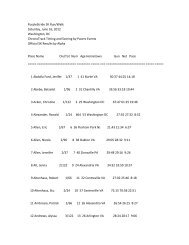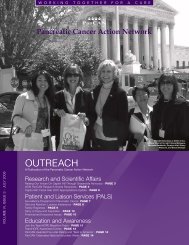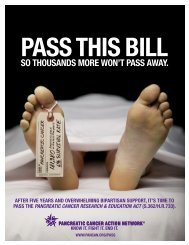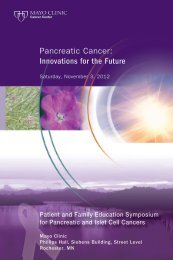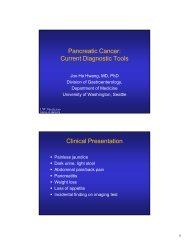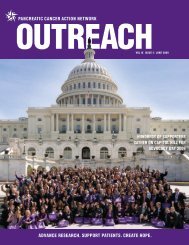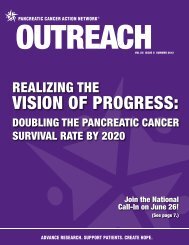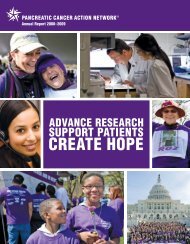outreach - Pancreatic Cancer Action Network
outreach - Pancreatic Cancer Action Network
outreach - Pancreatic Cancer Action Network
You also want an ePaper? Increase the reach of your titles
YUMPU automatically turns print PDFs into web optimized ePapers that Google loves.
MEET A GRANTEE<br />
JONATHAN BRODY, PHD: AIMING TO PERSONALIZE PANCREATIC<br />
CANCER TREATMENT<br />
Dr. Brody is the recipient<br />
of the 2010 Skip Viragh –<br />
<strong>Pancreatic</strong> <strong>Cancer</strong> <strong>Action</strong><br />
<strong>Network</strong> – AACR Career<br />
Development Award.<br />
He took a somewhat<br />
untraditional path to entering<br />
the fi eld of biomedical<br />
research, completing his<br />
undergraduate studies<br />
at Skidmore College on a<br />
music scholarship and then<br />
Jonathan Brody, PhD<br />
majoring in history. Halfway<br />
through his college education, Dr. Brody felt drawn to the<br />
biological sciences, and volunteered to help in the laboratory<br />
of Steven Rosenberg, MD, PhD, Chief of Surgery at the<br />
National <strong>Cancer</strong> Institute, where he began studying tumor<br />
immunology. The volunteer position became a technician<br />
position, and later on Dr. Brody enrolled in the graduate<br />
program at Johns Hopkins University to pursue a PhD in<br />
Pathobiology. He now works as an Assistant Professor of<br />
Surgery at Jefferson Medical College in Philadelphia, has<br />
a joint appointment in Pathology, is a staff member of the<br />
Kimmel <strong>Cancer</strong> Center, and serves as co-director of the<br />
Jefferson <strong>Pancreatic</strong>, Biliary, and Related <strong>Cancer</strong>s Center<br />
there. Dr. Brody was also recently named Chair of Surgical<br />
Research at Jefferson Medical College.<br />
Once Dr. Brody made a commitment to focus on pancreatic<br />
cancer research, he displayed tireless passion and intellect<br />
in pursuing his goal, which has been daunting. Among<br />
the challenges of studying pancreatic cancer is the lack<br />
of effective treatment options. Some patients respond well<br />
to gemcitabine, the chemotherapeutic standard of care for<br />
pancreatic cancer, but many do not.<br />
Dr. Brody’s aim is to determine why some patients’ tumors<br />
respond better than others to this treatment, specifi cally<br />
focusing on a protein called HuR. Clinical data suggest that<br />
patients whose tumors express HuR typically experience<br />
better outcomes with gemcitabine treatment. The ultimate<br />
goal of investigators is to create individual therapeutic<br />
regimens that will work best for each patient. Dr. Brody’s<br />
work offers powerful and exciting insights into achieving that<br />
objective.<br />
He refers to his day-to-day work as “intellectually<br />
fascinating and all-encompassing”, yet still fi nds time to<br />
play an active role in supporting activities of the <strong>Pancreatic</strong><br />
<strong>Cancer</strong> <strong>Action</strong> <strong>Network</strong>. Dr. Brody has attended several<br />
<strong>Pancreatic</strong> <strong>Cancer</strong> Symposia, PurpleStrides, <strong>Pancreatic</strong><br />
<strong>Cancer</strong> Advocacy Day and other events, allowing him to<br />
interact with patients and caregivers. He said that these<br />
experiences “add the feeling and heart” to his research,<br />
and that, after an event, he “can’t wait to get back into the<br />
laboratory and put in long hours”.<br />
His funding from the <strong>Pancreatic</strong> <strong>Cancer</strong> <strong>Action</strong> <strong>Network</strong><br />
was the fi rst large grant he received as a principal investigator.<br />
Now in his third year of overseeing his own laboratory, Dr.<br />
Brody said that the timing of this grant was perfect. “It was<br />
great ‘bridge money’ to pave the way for future laboratory<br />
funding,” he stated. He added that the award serves<br />
to validate his work as well as that of his departmental<br />
colleagues, including his close collaborator Charles Yeo,<br />
MD, who recruited Dr. Brody to Jefferson from Johns Hopkins<br />
University.<br />
Dr. Brody added that working as a young scientist can<br />
be quite diffi cult, especially when pursuing investigations<br />
into a disease that is as challenging and poorly funded as<br />
pancreatic cancer. He is gratifi ed that the <strong>Pancreatic</strong> <strong>Cancer</strong><br />
<strong>Action</strong> <strong>Network</strong> strives to build a community of researchers<br />
dedicated to studying the disease, provides ongoing support<br />
for them, and creates an optimal environment in which to<br />
conduct critical investigations.<br />
2 February 2011 OUTREACH<br />
In memory of Skip Viragh<br />
“The fact that I know [the Viragh family] is supporting my work makes me even<br />
more inspired to help fi nd a cure and understand this disease. This award will<br />
allow me to have the confi dence and the resources to pursue my goal of being a<br />
full-time pancreatic cancer researcher devoted to fi nding a cure for this disease. I<br />
am honored and humbled to be a small part of the Viragh legacy.”<br />
—Jonathan Brody, PhD, expressing his gratitude to the Viragh family for his grant




